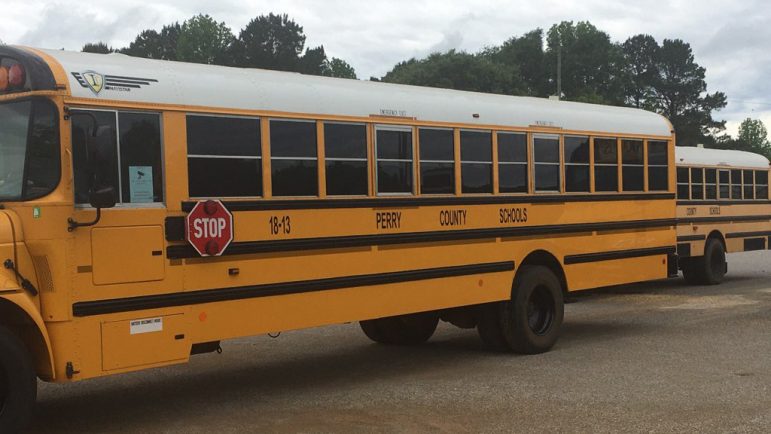In Rural Alabama, Pandemic Highlights Need For Broadband Access
Ben Eaton is one of roughly 9,000 people who live in Perry County, about an hour’s drive south of Tuscaloosa in the Black Belt region of Alabama. Eaton’s house is one mile from the center of town and, according to him, it is the last one on the street that has internet.
“It works sometimes. Sometimes it doesn’t,” he said.
He has a dial-up connection, which is pretty much the only option. Internet access has been a problem for years throughout rural Alabama. According to one survey, the state ranks 38th nationwide in broadband coverage. People in Perry County have especially felt the impact during the COVID-19 crisis.
“We need broadband,” Eaton said. “We need something that’s gonna help us get us through this.”
The Virtual Classroom
Schools have been closed for more than a month and teachers are supposed to be finishing classes remotely. But at least 20% of students in Perry County don’t have access to the internet at home. According to the local school superintendent, John Heard III, those with coverage have a slow connection or use cell phone data.
“It’s not very practical for a lot of our students because they don’t have the bandwidth to even do the Zoom sessions,” Heard said.
Schools are offering paper packets, but Heard said it’s not the same. Educators rely on the internet now. A few years ago, the district started providing students with an iPad or a ChromeBook, with assistance from the Apple ConnectEd program, and they have high speed internet at school. They just need access at home.
The Perry County school board recently invested in 10 buses equipped with WiFi. Starting this week, they are parked throughout the county every day from 11 a.m. to 3 p.m., providing free internet to anyone within 150 feet.

Perry County Schools
Perry County plans to continue using the WiFi-equipped buses after schools re-open. Heard said some students spend more than three hours every day on the bus and can use the internet to work on homework.
Heard said the school system paid more than $1,200 to outfit each bus, which is a lot of money for a poor county lacking revenue. But they had to do something.
“We just could not wait until we had the funds at hand,” Heard said, “because school would have been, you know, out.”
He said people in the area have been asking for broadband access for more than a decade, and not only to improve education.
Health Care From Home
Many people cannot work from home without an internet connection and some have already lost income as a result, according to Susan Jones, communications director of the nonprofit Sowing Seeds of Hope. Jones said in urban areas, people also use the internet to manage chronic illnesses and visit with a doctor, but she said residents in Perry County cannot get the full benefits of telemedicine.
“As far as the high tech things that make telemedicine so unique and so effective, where they can actually do some examinations of you, that’s not possible without better internet access than we currently have in most parts of the county,” Jones said.
At the same time, she said residents need more health care options. There is no hospital in Perry County, and people in the area have some of the worst health outcomes in Alabama. Heard said the COVID-19 crisis might finally spark action from state leaders.
“This pandemic has kinda highlighted that real need,” Heard said. “So I think we’re probably at a good spot for something to really happen besides talk at this point. We certainly hope so.”
Delayed Action
In 2018, Governor Kay Ivey started a fund to extend broadband to underserved areas. She recently used it to award nearly $10 million in grant money, though none of those projects will reach Perry County.
Democratic U.S. Senator Doug Jones said there is widespread political support for broadband expansion, and he expects to see more action soon.
“I think it has been a priority for the state of Alabama, as well as the Feds,” Jones said, “but now, we’ve got to rush that up.”
The state expects to receive $1.7 billion of federal relief money to address issues related to COVID-19. Alabama’s top Republican senator Del Marsh recently said he’d like to see $800 million of that go to broadband expansion.
Trump warns Iran not to retaliate after Ayatollah Ali Khamenei is killed
The Iranian government has announced 40 days of mourning. The country's supreme leader was killed following an attack launched by the U.S. and Israel on Saturday against Iran.
Iran fires missiles at Israel and Gulf states after U.S.-Israeli strike kills Khamenei
Iran fired missiles at targets in Israel and Gulf Arab states Sunday after vowing massive retaliation for the killing of Supreme Leader Ayatollah Ali Khamenei by the United States and Israel.
House Dem. Leader Jeffries responds to air strikes on Iran by U.S. and Israel
NPR's Emily Kwong speaks to House Minority Leader Hakeem Jeffries (D-NY), who is still calling for a vote on a war powers resolution following a wave of U.S.- and Israel-led airstrikes on Iran.
Iran’s Ayatollah Ali Khamenei is killed in Israeli strike, ending 36-year iron rule
Khamenei, the Islamic Republic's second supreme leader, has been killed. He had held power since 1989, guiding Iran through difficult times — and overseeing the violent suppression of dissent.
Found: The 19th century silent film that first captured a robot attack
A newly rediscovered 1897 short by famed French filmmaker Georges Méliès is being hailed as the first-ever depiction of a robot in cinema.
‘One year of failure.’ The Lancet slams RFK Jr.’s first year as health chief
In a scathing review, the top US medical journal's editorial board warned that the "destruction that Kennedy has wrought in 1 in office might take generations to repair."




